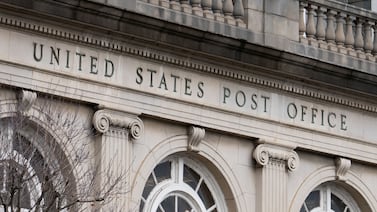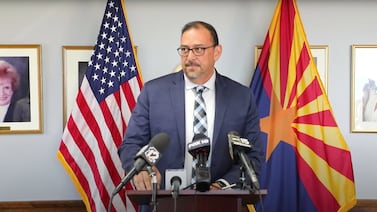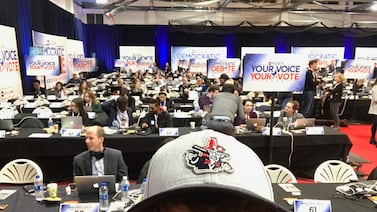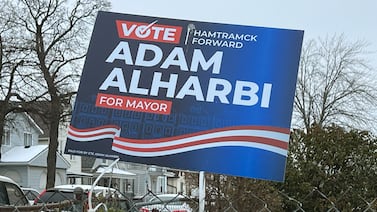Votebeat is a nonprofit news organization reporting on voting access and election administration across the U.S. Sign up for our free weekly newsletter to get the latest.
Newly elected members of the U.S. House of Representatives will convene Friday and vote on whether House Speaker Mike Johnson (R.-La.) will retain his leadership role. With Republicans holding the House by a narrow margin, as few as two GOP defections could prompt the kind of infighting that resulted in Johnson’s turbulent election in October 2023 and force multiple rounds of voting. That’s prompting concern that congressional certification of the presidential election results, slated for Jan. 6, could be disrupted.
Congress has never attempted to certify a presidential election without a House speaker in place, so the prospect of a longer leadership fight worries some people. In a phone interview with Votebeat, Justin Levitt, a constitutional law expert and professor at Loyola Law School, discussed the implications of divisions in the House and the likely paths forward. Levitt worked on the Electoral Count Reform Act and related issues while serving in the White House during the Biden administration. Here’s what he told us:
If the House elects Johnson or someone else as speaker on Friday, things should proceed normally. Does this seem like the most likely scenario right now?
Yes. I think there will be some drama — because, of course. But I think at the end of the day, he gets elected. And if for some reason he doesn’t, they will coalesce behind an alternate very quickly. It could be a very long couple of days, but I think it’s very likely to be resolved by the 6th.
What is the speaker’s role during the counting of electoral votes?
Certification isn’t a House procedure. The Constitution says, “The President of the Senate shall, in the Presence of the Senate and House of Representatives, open all the Certificates, and the Votes shall then be counted.” It’s an infamously passive passage. It’s one of the very few places constitutionally where Congress doesn’t act as they normally act. They all sit together, and the only constitutional officer is the president of the Senate. [Editor’s note: The current president of the U.S. Senate is Vice President Kamala Harris.]
Statutorily — in both the old and new Electoral Count Acts — there are two roles for the speaker, but neither are very significant. Thing one: The speaker appoints tellers — a role about as close to the Vanna White of the Jan. 6 process as you can get. It’s a purely symbolic role which is responsible for calling out the tally to the president of the Senate. Thing two: If there is an objection that meets the threshold — which is now 20% because of ECA reform — the speaker guides the House through resolution of the objections. But there aren’t going to be objections this time.
What are the ramifications of a dramatic speaker election, beyond presidential certification?
The first official act of the speaker is to swear everyone else in. But nothing in the Constitution says the speaker has to administer the oath. In the unlikely event that there is a protracted problem, someone will swear in the members who have been issued certificates so that they can sit for the session on Jan. 6. And while there’s some weirdness here because we’ve never been in this situation before, the Constitution also doesn’t require a speaker to be in place by the 6th.
Normally, the House doesn’t do legislative business until the speaker is sworn in. But temporary speakers can be appointed if there is something important to do. The clerk of the House will assemble the roster of House members based on election certificates. The clerk sets this up before anyone is sworn in, and unless there is a real dispute about an ongoing election — and there isn’t — everyone is likely to be fine with this.
Are the concerns about certification reasonable, or blowing things out of proportion?
I don’t think there’s a significant risk that a speakership battle will meaningfully impact the Jan. 6 tally. So in that sense, I don’t think it’s worth much anxiety. Just because something is unprecedented doesn’t automatically make it a disaster. The prospect of real constitutional crisis on the 6th this year belongs to the genre of doom-scrolling fantasy. Or, if you prefer, electoral process porn.
But I absolutely understand why there’s profoundly heightened attention. The GOP is divided, and their majority in the House is almost as narrow as it’s ever been … and our last vicious battle over the speaker is far from ancient history. There’s a chaos agent about to inhabit the White House, and he’s got a cohort of chaos agents of their own, including members of that same GOP majority. That’s relevant to a lot, including basic budgetary fights about keeping the lights on, and a lot of other fundamental issues beyond. And I don’t have to remind anyone that there was a pretty significant disruption on the last Jan. 6 of electoral note. So I absolutely understand the conflation of those two streams.
We’ll be fine on the 6th. But that’s not a claim about whether a majority this narrow, this divided, and on some issues, this radical, will be able to be functional on the 7th, or beyond. And if that’s the real source of the anxiety, I don’t think that’s out of proportion at all.
Jessica Huseman is Votebeat’s editorial director and is based in Dallas. Contact Jessica at jhuseman@votebeat.org.






